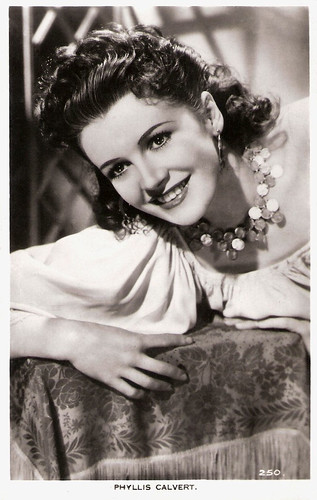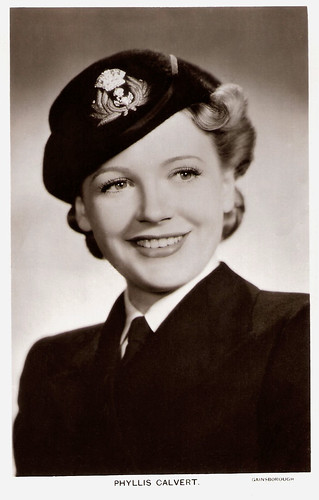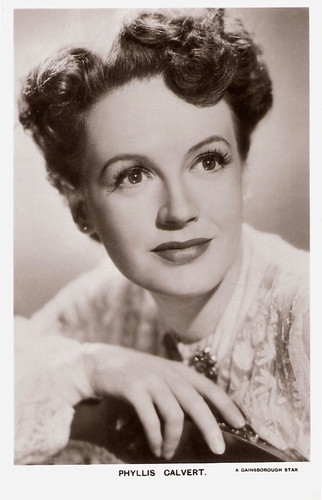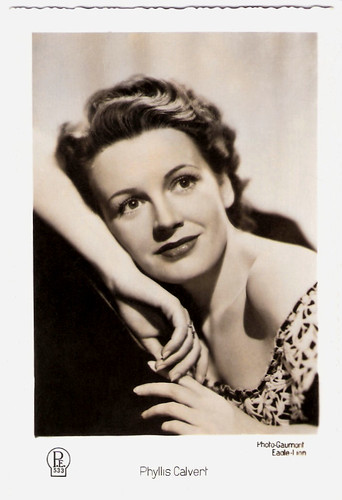
German postcard by Kunst und Bild, Berlin, no. A 084. Photo: J. Arthur Rank Organisation.
Virtuous victim
Phyllis Calvert was born Phyllis Hannah Bickle in Chelsea, in 1915. She studied at the Margaret Morris School of Dancing. An injury forced her to give up dancing and turn instead to acting. She made her stage debut at the age of ten in Crossings opposite Grande dame Ellen Terry in her last production.
At only 12, Phyllis gained her first small film role in The Arcadians/The Land of Heart's Desire (Victor Saville, 1927). It was the start of a 70-year film career. Calvert performed in repertory theatre and in several films, before making her London stage debut in A Woman's Privilege in 1939. In 1942, she had the lead role as Patricia Graham in Terence Rattigan's Flare Path. She also appeared in plays like The Heiress and Peter Pan, as the title role of the boy who never grew up.
In 1939, she met her husband, actor Peter Murray-Hill, during the run of a West End production of 'Punch Without Judy'. He later became a well-respected antiquarian bookseller specialising in 18th-century books. On the outbreak of war, when all the theatres closed, she went back to the Gainsborough Studios at Shepherd's Bush and worked with Arthur Askey in Charley's (Big-Hearted) Aunt (Walter Forde, 1940), a frolicsome version of Charley's Aunt. Calvert also played the leading lady in films like Two Days to Live (Walter Tennyson, 1939) and Let George Do It! (Marcel Varnel, 1939) opposite George Formby.
She first found success in the film adaptation of H. G. Wells' Kipps (Carol Reed, 1941), in which she was cast as the servant girl opposite Michael Redgrave, a part that had originally been turned down by Margaret Lockwood. But it was in the Gainsborough melodrama The Man in Grey (Leslie Arliss, 1943) in which she played virtuous victim Clarissa opposite heart-throb Stewart Granger, bad-girl Margaret Lockwood and heartless husband James Mason, that truly catapulted her to stardom.
Bruce Eder at AllMovie: “The script's combination of period detail and dark, lusty motivations for its characters enabled Mason, as well as Granger, Margaret Lockwood (previously known for playing good-natured, plucky heroines), and Phyllis Calvert all a chance to tap into aspects of their respective ranges that had been untouched onscreen, and show more than they'd ever been able to of their acting abilities, as well as a then-unusual charisma, growing out of the flawed natures they portrayed. The result, when laced with large dollops (for its time) of sadism, was a box-office bonanza and the elevation of all four lead actors to international star status.”

British postcard by Real Photograph, no. 250. Sent by mail in 1948. Photo: publicity still for Madonna of the Seven Moons (Arthur Crabtree, 1945).

British postcard in the Picturegoer Series, London, no. W 131. Photo: Gainsborough. Publicity still for The Man in Grey (Leslie Arliss, 1943).
Steadfast no-nonsense leader
With her elegant carriage, ladylike manners, upper-middle-class airs and genteel graces, Phyllis Calvert won millions of hearts. During the following decade, she became one of the names most associated with the Gainsborough costume melodramas of the 1940s, usually as the sweet heroine, or the steadfast no-nonsense leader. Her films included Madonna of the Seven Moons (Arthur Crabtree, 1945), in which a gipsy curse forced her to be wife, mother and mistress all in one, and Fanny by Gaslight (Anthony Asquith, 1945).
In the latter, she falls prey once more to James Mason, this time playing the dastardly Lord Manderstoke, who, having killed her father, is determined to seduce her. Once again Stewart Granger is the staunch hero, bent on keeping her virtue intact. In 1945 and 1946, British film exhibitors voted her among the top ten British stars at the box office via an annual poll in the Motion Picture Herald.
In its obituary of her, The Telegraph would later observe: “Often cast in films and plays as ‘the other woman’ or the ‘long-suffering wife’, Phyllis Calvert became a tasteful symbol of well-bred British womanhood, exuding a decent measure of sexuality but also developing a personality which made her off-screen attitudes to fame, fortune, marriage, motherhood, film-makers and the Second World War as engagingly sincere as her acting.” It made her one of Britain's highest-paid stars. However, three Hollywood studios failed to pay her what she asked. For Paramount, she starred with Melvyn Douglas in My Own True Love (Compton Bennett, 1949) and with Alan Ladd in Appointment with Danger (Lewis Allen, 1951), but without success. After 7 years in Hollywood, she returned to England.
There she earned her one BAFTA nomination for the role of the mother in Mandy/Crash of Silence (Alexander Mackendrick, 1952), battling with Terence Morgan over the future of their deaf daughter. The film allowed her the opportunity to demonstrate a range that all too often went untapped earlier in her film career. After that, her film career slowed down, with family taking precedence.
While shooting the comedy Indiscreet (Stanley Donen, 1958) as Ingrid Bergman’s sister, she was struck a cruel blow when her husband of 16 years, Peter Murray-Hill, passed away. They had two children, Ann Auriol (1943) and Piers Auriol (1954). In 1959 Calvert had a quite spectacular success as a wife whose feelings vacillated painfully between Ralph Richardson's husband and Paul Scofield's lover in Graham Greene's 'The Complaisant Lover' at the Globe Theater. This was a performance to wipe away all fond recalls of her wartime films.

British postcard in the Picturegoer Series, London, no. W 227. Photo: J. Arthur Rank Organisation.

British postcard. Photo: Gainsborough.
That's my idea of dull
In the 1960s, Phyllis Calvert’s stage career picked up markedly when she began taking more and more roles to raise their two children solely. Her stage successes include her roles as the Countess in Jean Anouilh's 'The Rehearsal' (1961), the unfeeling stepmother in James Saunders' 'A Scent of Flowers' (1964), as the exasperated wife in Noel Coward's 'Blithe Spirit' (1970) and as Madame Ranevskaya in Anton Chekhov's 'The Cherry Orchard' (1971).
Her later films include the thriller Twisted Nerve (Roy Boulting, 1968) starring Hayley Mills, the satire Oh! What a Lovely War (Richard Attenborough, 1969) and The Walking Stick (Eric Till, 1970) with David Hemmings.
She gracefully slid into a niche of character roles, usually the kindly mother or aunt. Calvert played on television Mrs. March in the serials Little Women (Alan Bromley, 1958) and Good Wives (1958) both adapted from Louisa May Alcott's novel Little Women. A decade later she landed the part of a journalist who wrote a column of advice to the lovelorn and stood no nonsense, emotional or otherwise, from errant husbands, moody housekeepers or hysterical young wives, in the TV series Kate (1970-1972).
In the 1980s she concentrated on television and appeared in series like Lady Killers (1981), Roald Dahl’s Tales of the Unexpected (1983), the P.D. James adaptation Cover Her Face (1985), Boon (1987), and in popular TV movies such as The Death of a Heart (Peter Hammond, 1987). Later on, she had small parts in such hit series as Mr. Bean (1993) and The House of Eliott (1994).
Her last stage role was in 'Bed' (1994). "Some people love sitting in a chair," she said, reflecting on her long career, "that's my idea of dull." During her career, she acted in over 40 films and her final film was the period drama Mrs Dalloway (Marleen Gorris, 1997) based on the novel by Virginia Woolf and starring Vanessa Redgrave. At 87, Phyllis Calvert died peacefully in her sleep at a hospital in London in 2002.

Belgian postcard by P.E., no. 533. Photo: Gaumont / Eagle Lion.

Small vintage collectors card. Photo: Universal International.
Sources: Hal Erickson (AllMovie), Bruce Eder (AllMovie), David Absalom (British Pictures), The Telegraph, BBC News, Wikipedia and IMDb.
This post was last updated on 24 August 2023.
No comments:
Post a Comment